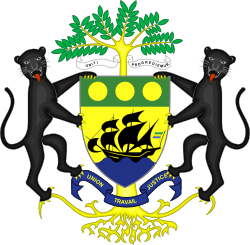Health in Gabon
Most of the health services of Gabon are public, but there are some private institutions, of which the best known is the hospital established in 1913 in Lambaréné by Albert Schweitzer. The hospital is now partially subsidized by the Gabonese government.
Health infrastructure
Gabon’s medical infrastructure is considered one of the best in West Africa. By 1985 there were 28 hospitals, 87 medical centers, and 312 infirmaries and dispensaries. As of 2004, there were an estimated 29 physicians per 100,000 people.
Approximately 90% of the population had access to health care services. In 2000, 70% of the population had access to safe drinking water and 21% had adequate sanitation.
Health status
Life expectancy
The 2014 CIA estimated average life expectancy in Gabon was 52.06 years.[1]
Fertility rate
The total fertility rate has decreased from 5.8 in 1960 to 4.20 children per mother during childbearing years in 2000.
Endemic diseases
A comprehensive government health program treats such diseases as leprosy, sleeping sickness, malaria, filariasis, intestinal worms, and tuberculosis. Rates for immunization of children under the age of one were 97% for tuberculosis and 65% for polio. Immunization rates for DPT and measles were 37% and 56% respectively. Gabon has a domestic supply of pharmaceuticals from a large, modern factory in Libreville.
Maternal and child healthcare
The 2010 maternal mortality rate per 100,000 births for Gabon is 260. This is compared with 493.5 in 2008 and 422.5 in 1990. The under 5 mortality rate, per 1,000 births is 71 and the neonatal mortality as a percentage of under 5's mortality is 36. In Gabon the number of midwives per 1,000 live births is 12 and the lifetime risk of death for pregnant women 1 in 110.[2]
Ten percent of all births were low birth weight.
HIV/AIDS
The HIV/AIDS prevalence is estimated to be 5.2% of the adult population (ages 15–49).[3] As of 2009, approximately 46,000 people were living with HIV/AIDS.[4] There were an estimated 2,400 deaths from AIDS in 2009 – down from 3,000 deaths in 2003.[5]
Ebola
World Health Organization specialists and the government of Gabon took immediate action against the mid-1990s re-emergence of the [[Ebola]
References
- "CIA - The World Factbook Life Expectancy". Cia.gov. Retrieved 2014-06-24.
- "The State Of The World's Midwifery". United Nations Population Fund. Retrieved 1 August 2011.
- CIA world factbook: HIV/AIDS – adult prevalence rate
- CIA world factbook: People living with HIV/AIDS
- CIA world factbook: HIV/AIDS deaths
![]()
